最新非谓语动词表格形式
- 格式:doc
- 大小:81.50 KB
- 文档页数:16

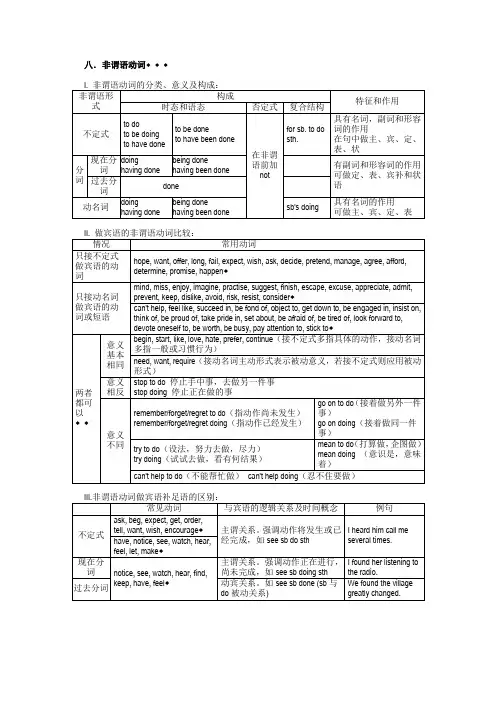
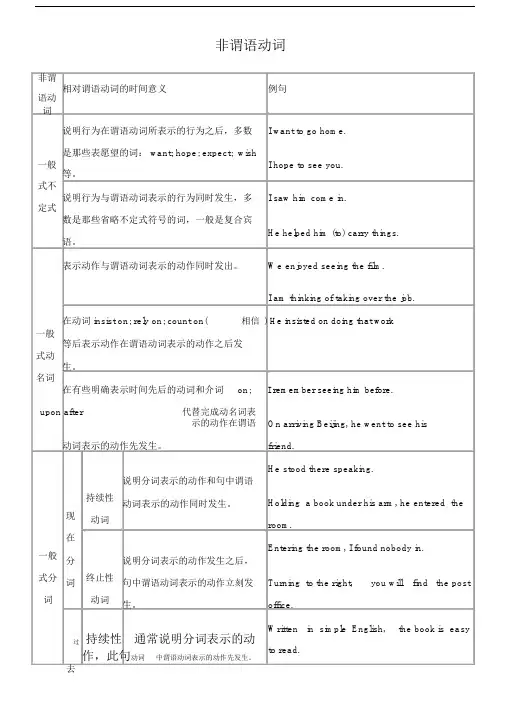
非谓语动词非谓相对谓语动词的时间意义例句语动词说明行为在谓语动词所表示的行为之后,多数I want to go home.一般是那些表愿望的词: want; hope; expect; wishI hope to see you. 等。
式不I saw him come in.定式说明行为与谓语动词表示的行为同时发生,多数是那些省略不定式符号的词,一般是复合宾He helped him (to) carry things.语。
表示动作与谓语动词表示的动作同时发出。
We enjoyed seeing the film.I am thinking of taking over the job.在动词 insist on; rely on; count on(相信) He insisted on doing that work一般等后表示动作在谓语动词表示的动作之后发式动生。
名词在有些明确表示时间先后的动词和介词on;I remember seeing him before. upon after代替完成动名词表示的动作在谓语动词表示的动作先发生。
说明分词表示的动作和句中谓语持续性动词表示的动作同时发生。
现动词在一般分说明分词表示的动作发生之后,式分词终止性句中谓语动词表示的动作立刻发词动词生。
过持续性通常说明分词表示的动作,此句动词中谓语动词表示的动作先发生。
去On arriving Beijing, he went to see hisfriend.He stood there speaking.Holding a book under his arm, he entered the room.Entering the room, I found nobody in.Turning to the right, you will find the post office.Written in simple English, the book is easy to read.分I can't find my lost pen.词说明分词表示的动作和句中谓语He is a person well-known in this country.动词表示的动作并无先后。
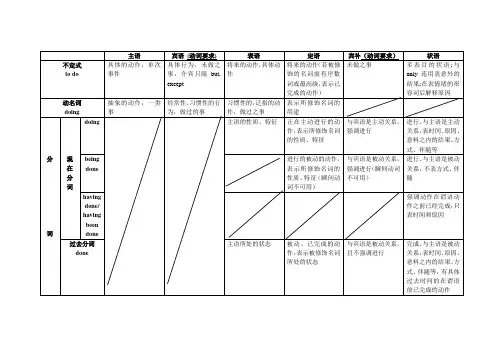
![高中非谓语动词用法总结表格版[汇编]](https://uimg.taocdn.com/6fefe8cd51e2524de518964bcf84b9d529ea2c59.webp)
非谓语动词非谓语动词相对谓语动词的时间意义例句一般式不定式说明行为在谓语动词所表示的行为之后,多数是那些表愿望的词:want; hope; expect; wish等。
I want to go home.I hope to see you.说明行为与谓语动词表示的行为同时发生,多数是那些省略不定式符号的词,一般是复合宾语。
I saw him come in.He helped him (to) carry things.一般式动名词表示动作与谓语动词表示的动作同时发出。
We enjoyed seeing the film.I am thinking of taking over the job.在动词insist on; rely on; count on(相信)等后表示动作在谓语动词表示的动作之后发生。
He insisted on doing that work在有些明确表示时间先后的动词和介词on;upon after代替完成动名词表示的动作在谓语动词表示的动作先发生。
I remember seeing him before.On arriving Beijing, he went to see his friend.一般式分词现在分词持续性动词说明分词表示的动作和句中谓语动词表示的动作同时发生。
He stood there speaking.Holding a book under his arm, he entered theroom.终止性动词说明分词表示的动作发生之后,句中谓语动词表示的动作立刻发生。
Entering the room, I found nobody in.Turning to the right, you will find the post office.过去分词持续性动词通常说明分词表示的动作,此句中谓语动词表示的动作先发生。
Written in simple English, the book is easy toread.I can't find my lost pen.说明分词表示的动作和句中谓语动词表示的动作并无先后。

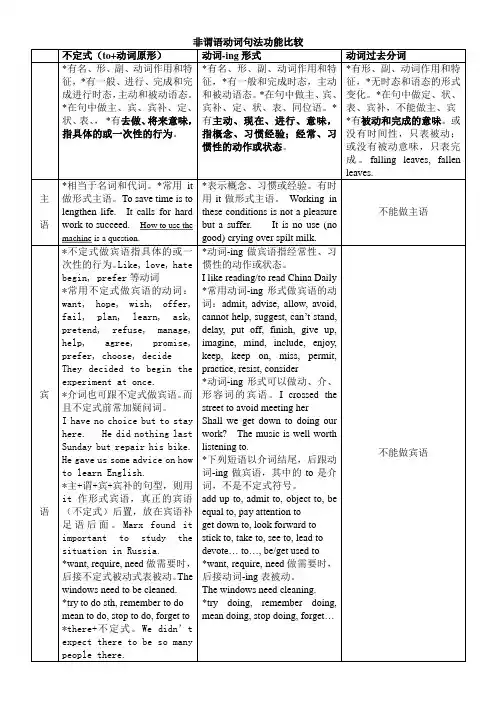
非谓语动词形式比较重复需注意的要点1.动词不定式一般式表示的动作可能与谓语动词的动作同时发生,也可能在其之后发生。
例如:I saw the young man enter the house.(同时发生)I hope to go there next time.(之后发生)2.不定式完成式表示不定式的动作在谓语动词之前发生。
例如:I’m sorry to have broken your glasses.3.不定式进行式表示不定式的动作,与谓语动词同时发生。
例如:When he came in, I happened to be reading at the table.4.不定式的被动式有两种形式:to be done表示将要被做,to have been done表示已被做。
例如:The new cinema to be put up next year will be very large.The cinema is said to have been built last year.5. 在表示情绪的动词,如like, love, hate, prefer等后,用动名词作宾语表示一般倾向,用不定式表示特定某事。
但在would/should like/love/prefer后要用不定式例如:I hate eating the same food every day. Would you like to watch TV in the evening?6. 在动词need, want, require后用动名词表示被动含义,相当于动词不定式的被动式;而用动词不定式的主动式表示主动含义。
例如:The house needs cleaning. = The house needs to be cleaned. He needs to clean the house first.7. 在介词后一般用动名词作宾语,但在少数介词,如but, except后用动词不定式作宾语,但要注意“to”的省略,如but前有“do”则省去“to”。

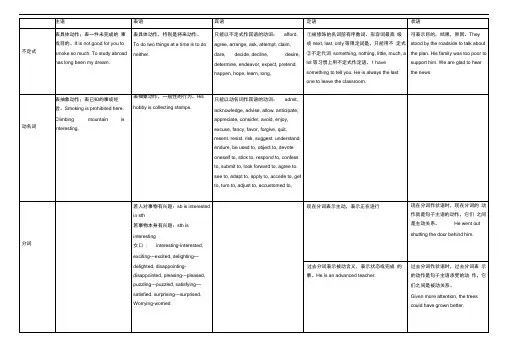

非谓语动词图表(总8页)--本页仅作为文档封面,使用时请直接删除即可----内页可以根据需求调整合适字体及大小--非谓语在句中充当除谓语以外的句子成分的动词形式叫做非谓语动词。
非谓语动词分为三种形式:不定式、动名词和分词(分词包括现在分词和过去分词)逻辑主语与真正主语真正主语:谓语动作发出者,即真正主语。
逻辑主语:非谓语动作的发出者或者承受者。
构成非谓语动词句型的首要条件:逻辑主语与真正主语一致。
To acquire knowledge , you must study解析:条件:此句真正主语:you 逻辑主语:you 主语一致。
结论:可构成非谓语句型非谓语使用条件一个句子当中,已经存在一个主句(谓语动词),又没有连词的情况下She got off the bus but left her handbag on her seat.She got off the bus, leaving her handbag on her seat.非谓语动词做主语的区别:1. ________ a language requires time and effort.A. LearnB. LearningC. To learnD. Being learned2. It is not always easy ________ invitations.A. to refuseB. refusingC. to be refusedD. being refused3. How __________ the problem will be discussed at tomorrow’s meeting.A. to solveB. to be solvedC. being solvedD. solving4. It __________ forty-five minutes __________ there by bus.A. cost, to getB. takes, gettingC. takes, to getD. takes, to get to5. It is no good __________. You should give_________.A. to smoke, it upB. smoking, it upC. smoking, up itD. to smoke, up it1. He gave us some advice on how ____ English.A. learningB. learnedC. to learnD. learn2. It ’s a pay day, and they are waiting ____.A. payB. payingC. paidD. to be paid3. I don’t know whether you happen, but I’m going to study in the this September . A.to be heard B. to be hearingC.to hear D. to have heard4. I forgot _____ my name when I finished ____ the composition.A. to sign, to writingB. to sign, writingC. signing, writing5. ---You were brave enough to raised objections at the meeting.---Well, now I regret ____ that.A. to doB. to be doingC. to have doneD. having done6. She can’t help ____ the house because she’s busy making a cake.A. to cleanB. cleaningC. cleanedD. being cleaned1. Her wish is __________ an engineer.A. becomingB. becomeC. to becomeD. being comepeople’s greatest pleasure is __________.A. fishingB. to fishC. to be fishingD. being fish3. The report was so _______ that they were all __________.A. inspiring, excitingB. inspiring, excitedC. inspired, excitedD. inspired, exciting4. ---“You look pale.”---“I feel a little __________.”A. tireB. tiredC. tiringD. tiresome非谓语动词做定语的区别:1. She said she had a important meeting ______.A. to attend inB. to attendC. attendD. attending2. He is always the first ______ questions.A. to answerB. answeringC. to be answeredD. being answered3. The Olympic Games _______ in the year 2016 will be a great success.A. being heldB. to be heldC. heldD. to hold4. The first textbooks ____ for teaching English as a foreignlanguage came out in the 16th century.A. having writtenB. to be writtenC. being writtenD. written5. At present, English is the main subject ___________ here.A. to be taughtB. being taughtC. teachingD. to be teaching6. ---"Who are those people with the banner"---"A group _______ itself the League for peace."A. callingB. callsC. calledD. is called7. The pen __________ belongs to me.A. which it is on the tableB. lying on the tableC. is on the tableD. which on the table1. I have enjoyed my visit here. I'll be very sorry __________.A. for leavingB. of leavingC. to leaveD. left2. I went to see him __________ him out.A. findingB. findC. only to findD. only found3. __________ the cry for help, people immediately rushedout of the rooms.A. To hearB. HearingC. Having heardD. They hearing4. __________ Hello, he reached out his hand.A. SaidB. SayingC. Talked aboutD. Talking to5. _________ from the tallest building, the whole city looks very beautiful.A. SeeB. SawC. SeeingD. Seen6. ___________ the past, our life is much better.A. Comparing withB. Be compared withC. To compare withD. Compared with非谓语动词做宾语补足语的区别:1. The doctor advised Lao Li __________ more rest.A. that he getB. to getC. would getD. get2. Soon they saw the boy _________ in the crowd.A. disappearB. to disappearC. disappearsD. disappeared3. Birds are seldom heard __________ at night.A. singB. singingC. to singD. to be singing4. He kept me __________ for many hours.A. to waitB. having been waitedC. waitingD. waited5. Mother caught the boy __________ in the corner.A. smokeB. to smokeC. smokingD. being smoked6. Having read the Emperor's New Clothes, we all found it ___.A. interestB. interestedC. interestingD. to interest7. I need this chapter __________ before tomorrow.A. rewritingB. rewrittenC. rewriteD. to write again8. When she returned home, she found the window open and something __________.A. to stealB. losingC. missedD. stolen9. There was so much noise that the speaker could not make himself _________.A. being heardB. heardC. hearingD. hear非谓语动词的时态和语态:1. around the Water Cube, we were then taken to see the Bird’s Nest for the 2008 Olympic Games. A. Having shown B. To be shown C. Having been shown D. To show2.【2012重庆】______to work overtime that evening, I missed a wonderful film.A. Having been asked B. To ask C. Having asked D. To be asked3.【2008福建】___ in the queen for half an hour, the old man suddenly realized be had left the cheque in the car. A. Waiting B. To wait C. Having Waited D. To have waitedson pretended _______ when I came back.A. to sleep B. sleeping C. being sleeping D. to be sleeping5.【2011上海】Today we have chat rooms, text messaging, emailing…, but we seem _____ the art of communicating face-to-face.A. losing B. to be losing C. to be lost D. having lostis the man ____now?A. operating on B. operated on C. being operated on D. to be operated onquestion ______ now at the meeting is not the question ______ yesterday.A. discussed; discussed B. discussing; had discussedC. being discussed; discussed D. discussing; discussingasked ___ to work in the countryside.A. to be sent B. to send C. to be sending D. sendinga letter, he decided to send a telegram.A. Not receiving B. Receiving not C. Not having received D. Having not received10The purpose of new technologies is to make life easier, ______ it more difficult.A. not make B. not to make C. not making D. do not make独立主格结构1)独立主格结构的逻辑主语与句子的主语不同,它独立存在。

非谓语动词 1 2 一. 动词不定式 3 1. 动词不定式的构成:to + 动词原形(这里的to是不定式符号,本4 身无词义) 5
否定:not+ (to +) 动词原形 6 2. 动词不定式的句法功能 7
功能 例句 说明
主语 To speak English is not easy for us. = It is not easy for us to speak English. 作主语用的不定式,常常用it作形式主语,而把不定式放在后面,其结构为:It+be+adj.+(for/of sb.)+动词不定式
表语 My work is to clean the room every day. = To clean the room every day is my work. 多数情况下,不定式作表语,可转换为作主语
宾语 —What sports does he like to play? — He likes to play basketball. 只能作某些动词的宾语,一般不做介词的宾语 宾补 My mother made me play the piano all the time. 在make, let, see, hear, watch等使役动词后,不定式省略to
定语 Have you got anything to say? 不定式做定语,要放在所修饰词的后面
状语 I’m sorry to trouble you. 不定式作状语,其逻辑主语要和句子的主语一致
8 9
1.to do 作主语常用it 作形式主语 10 例: To learn English well is useful. → It is useful(for us)11 to learn English well. 12
注意:在kind, good, nice, clever等表示人的品质的形容词后,不用13 for而用of. 14
2.一些表示命令,打算或希望的动词后只接动词不定式作宾语:would like, 15 like(想要), want, wish, hope, decide, plan, except等。 16
例:Would you like too see a film this evening? 17 3.在find, think后跟动词不定式作宾语时,常用it代替,而将真正的宾语18 放在句末。 19
例:I find it easy to read English every day. 20 4.常见的一些不带to 的动词不定式作宾语 21 Why not do ……, why don’t you do…, had better (not) do…, would 22 rater do…, could/ would/ will you please (not) do… 23
例: I would rather stay in the room. 24 5.一些使役动词和感官动词用不定式作宾语,但to要省略。 25 一感(fell)、二听(hear, listen to)、三让(let/ make/ let)、四看26 (look at, see, watch, notice)、五帮助(help),但变为被动语态是必27 须加上to. 28
例:My friends were made to work the whole night by the boss. 29 6.不定式常和疑问词what,which,when,where,how连用,相当于一个宾语从30 句。 31
32 二. 动名词 33 1. 动名词的构成: 动词原形+-ing 34 2. 动名词的句法功能 35 36 37
功能 例句 说明
主语 Eating too much is bad for your health. 谓语动词用单数形式
宾 动词 I like playing basketball 表示一般的习惯或抽象行为或 语 宾语 very much. 经常性动作 介词 宾语 Stamps are used for sending letters.
表语 His hobby is collecting stamps= Collecting stamps is his hobby. 多数情况下,动名词作表语可装换成做主语
定语 She is in the reading room. 只表明它所修饰的词的用途、所属关系等。至置于所修饰词之前
常跟动名词作宾语的词:完成实践值得忙(finish, practice, be worth, be 38 busy) 39
继续习惯别放弃(keep on, be used to, give up) 40 考虑建议不禁想(consider, suggest, can’t help, 41 feel like) 42
喜欢思念要介意(enjoy, miss, mind) 43 三. 分词 44 1. 构成: 动词+ -ing 45 动词 + -ed 46 2. 分词的句法功能 47 功能 例句 说明 定语 Do you know the girl standing under the tree? Please hand in your written exercise. 现在分词作定语,其逻辑主语就是它所修饰的词;过去分词作定语,其逻辑宾语就是它所修饰的词。
状语 The students went out of the classroom, talking and laughing. Seen from the hill, out school looks more beautiful. 分词的逻辑主语是句子的主语
表语 The situation is encouraging. The boy is too frightened to move. 现在分词表示主语的性质、特征;过去分词表示某种状态(也就是我们常说的人用-ed,物用-ing.)
补足语 Don’t keep us waiting for a long time. I heard him singing in the classroom. He’ll have his hair cut after school. 现在分词作补足语,被补足的宾语或主语是它的逻辑主语(即主动关系);过去分词作补足语,被补足的宾语或主语是它的逻辑宾语(即被动关系) 48 四. 易混清单 49 1. 动词后接不定式和动名词的区别 50 stop to do sth. 停下来去做 51 stop doing sth. 停止做 52 remember to do sth. 记住要做某事(动作未发生) 53 remember doing sth. 记得曾经做过某事(动作已发生) 54 55 forget to do sth. 忘记做某事(动作未发生) 56 Forget doing sth. 忘记做过某事(动作已发生) 57 58 try to do sth. 努力去做某事 59 Try doing sth. 试着去做某事 60 61 go on to do sth. 做完一件事,接着去做另一件事 62 go on doing sth. 继续不停地做某事 63 64 allow doing sth. 允许做某事 65 allow sb. to do sth. 允许某人做某事 66 67 regret to do sth. 对要做的事感到遗憾(未做) 68 Regret doing sth. 对做过的事感到遗憾,后悔(已做) 69 70 mean to do sth. 打算,想做某事 71 mean doing sth. 意味着做某事 72 二. 现在分词和动词不定式作宾语补足语的区别 73 我们常见的动词有see, watch, notice, hear, feel, have等,它们接不带74 to的动词不定式作宾补,表示已经完成了的经常性的动作;接现在分词做宾补,75 表示动作正在进行着。 76
例: I heard him singing in the classroom. (“唱”这个动作正在进行) 77 I heard him sing in the classroom. (“唱”这个动作已经结78 束) 79
三. Need, require, want 做“需要”解时,后加动名词主动式等于加不定80 式的被动式。 81
例: The window needs cleaning. →The window needs to be cleaned. 82 want to be done=want doing 83 need to be done=need doing 84 require to be done=require doing 85 四. 现在分词与过去分词的区别 86 1. 在语态上,现在分词表示主动,过去分词表示被动(修饰人用87 -ed,修饰物用-ing)。 88
例: the surprising news 令人惊讶的消息 89 a surprised man 一个感到惊讶的人 90 2. 在时间上,现在分词表示正在进行的动作,过去分词表示已近完成的动作。 91 例: the developing country 发展中国家 92 the developed country 发达国家 93 五. 注意下列“to” 是介词,不是动词不定式。 94 make (a) contribution(s) to 为……作贡献 95 devote to 献身,致力于…… 96 look forward to 期盼,盼望 97 prefer ……to……两者间更喜欢…… 98 be used to … 习惯…….;适应…… 99 100 101 102 103 104 105 106
1. Granny often tells us ______ water in our daily life. 107
A. save B. saving C. to save D. saves